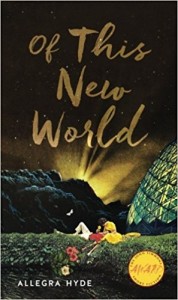Book Review
 Allegra Hyde’s debut collection, Of This New World, is wide-ranging in its content. There’s a story about Adam and Eve, a story about a veteran, and a story about colonists on Mars. Many of the stories involve disillusionment and self-discovery of the type we often find in literary fiction, but there’s a more specific theme that comes up again and again: negligent parenting.
Allegra Hyde’s debut collection, Of This New World, is wide-ranging in its content. There’s a story about Adam and Eve, a story about a veteran, and a story about colonists on Mars. Many of the stories involve disillusionment and self-discovery of the type we often find in literary fiction, but there’s a more specific theme that comes up again and again: negligent parenting.
Many of the stories in Of This New World involve parents who put ideas ahead of people—even their own children. “Free Love” is the story of a young woman who grew up on a commune with her guru father and drug-addled mother and who now finds herself under the same roof as her grouchy nana. The present action of the story consists of the girl trying to make her way at a regular suburban school while thinking back to her old life and wondering if her parents ever think about her. We get the sense they don’t. In a similar vein, the short story “Syndication” shows a girl leading her little brother away from the house where their “doomsday-prepping bandana-wearing parents” are digging their own graves. In “The Future Consequences of Present Actions”—one of the finest stories in the collection—a nineteenth-century widower in search of the perfect religion for his tendency towards self-denial signs away his son to the Shakers. Even the story about Adam and Eve, “After the Beginning,” is, in a sense, about the children of the original negligent parents. The couple finds themselves in a wilderness of chores and shame after their expulsion by God from the “lush ambrosial garden” of Eden. Adam is taking it badly.
“Shark Fishing,” a standout story that first appeared in New England Review, is premised on the willingness of a certain type of parent to place their children in the hands of a near-stranger for the sake of an “enriching” (i.e. college application-padding) experience such as Outward Bound or Semester at Sea. In “Shark Fishing,” a young activist named Dawn, already losing faith in pamphlets and protests and her life in Brooklyn, finds steady work at Camp Hope, a fledgling school on Eleuthera in the Bahamas. Camp Hope is the brainchild of Roy Adams, “a former Navy SEAL turned born-again tree hugger,” who envisions Camp Hope as “part school, part eco-base camp,” and a sustainable model for the rest of the world. Camp Hope appeals to Dawn’s need for an escape and her idealism, and Roy Adams appeals to her need to please and serve. Dawn’s inherent militancy is revealed over the course of the story, and soon she is Adams’s most valued lieutenant, the only teacher who can be trusted to place Camp Hope first, its students second. Over the course of the story, Dawn, already disillusioned, is disillusioned once again, and yet this is, at its core, a story of self-discovery.
“Shark Fishing” is one of the more formally adventurous stories in the collection. Dawn’s Camp Hope experience is embedded in a lecture she’s giving at Harvard (everything has worked out for her, if not for Camp Hope or its students) and interwoven with facts about the original settlers. Hyde’s juxtaposition of the original settlers and the Camp Hope staff, who can be thought of as settlers as well, gives the story an additional layer of energy. Other stories in the collection also get their energy from narrative jumps. “VFW Post 1492” cuts back and forth between the boring life of a paraplegic veteran living with his mother and the imagined life of the veteran’s twin—an artist in Istanbul who may or may not be having sex with a mutual friend. By juxtaposing the two storylines, instead of explaining their connection, Hyde leaves open the possibility that the veteran really can experience some semblance of his twin’s consciousness, and may even find consolation there.
I recommend Of This New World to fans of literary short stories. It has the usual elements: well-developed characters, self-discovery, richly imagined worlds, and the type of un-showy formal experimentation we can expect from winners of the Iowa and John Simmons Short Fiction Awards. It also has a little something extra, and that something, to me, is Hyde’s conspicuous emphasis on parenting. I should admit here that I’m a new parent of a fourteen-month-old daughter, and I can imagine this book as an appropriate gift for expecting parents—a warning of what not to do.
About the Reviewer
Bradley Bazzle is the author of the novel Trash Mountain, forthcoming from Red Hen Press. His short stories appear in New England Review, New Ohio Review, Epoch, Web Conjunctions, and elsewhere, and have won awards from Third Coast and the Iowa Review. Some of them can be found at bradleybazzle.com. He lives in Athens, Georgia, with his wife and daughter.